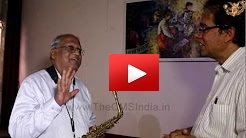
AP 60 to 51
Syriac melodies on the saxophone by Johny P. David
| Call Number | AP 56 |
| Part Number | Part I - Syro Malabar Church |
| Title | Syriac melodies on the saxophone by Johny P. David |
| Duration | 30:22 |
| Place of Recording | Johny P. David's residence |
| Date of Recording | 26 July 2016 |
| Youtube URL | https://www.youtube.com/watch?v=tQiwu_FF-sM&t=196s |
| Video Segment (s) | AP 56a to 56d |
Notes
Johny P. David, a great blessing. Syriac chants on saxophone Johny P. David, who plays Syriac melodies on the saxophone, is a great blessing to the well-wishers of the Aramaic Project was well as anyone who is interested in the history of the Syriac chant repertoire in Kerala, India. He adds an all new dimension to the experience of the sonority, sensibility and tenderness of the Syriac melodies. More importantly, Johny is an avant-gardist, who took the melodies from their sacred setting of liturgical texts and semantics and brought them to the secular realm of music per se for anyone to experience them irrespective of religious affinities. That being said, playing these melodies, which are ensconced in his childhood memories, is an intense religious experience for Johny. In one instance, Johny accepted my request to play around the melody of the commemoration hymn from the solemn high mass in Syriac. The idea was to venture into a compose-while-playing experiment, similar to what a jazz musician would attempt. Although Johny was not happy with the result, the segment bespeaks immense potential for musical experiments using Syriac melodies. Johny P. David is a true representative of the transitional generation that lived through the transference of the Chaldean liturgy of the Syro Malabar Church from Syriac to Malayalam, in the 1960s. His memory base includes melodies that he learned in the 1950s, during his younger years as a choir boy at Infant Jesus Church at Thalore in the Thrissur district of Kerala. Significantly, some of those melodies are known only to Johny. More significantly, some of those melodies were composed in Kerala, and are embedded in the history of the Syro Malabar Church (see my notes on Aramaic Project 56A https://youtu.be/0UhiLbAaht4 ; 56B https://youtu.be/mkM4NBKka-w ; 56C https://youtu.be/IEXhhCPD-9k ). Had Johny not kept up his memories and practice, these melodies would have been lost forever. The Syro Malabar Catholics have reasons to be proud of Johny P. David. All in all, this short interview provides Kerala music historians and musicologists with ample material for their research pursuits.
3 March 2017
Video Segments
- AP 56a - Johny P. David plays “Śambah leśān” on alto saxophone.
- AP 56b - Johny P. David plays “Śambah leśān” with instrumental accompaniment.
- AP 56c - Johny P. David plays Kollan dašne with instrumental accompaniment.
- AP 56d - Johny P. David plays Qandiśā alāhā on alto saxophone.



